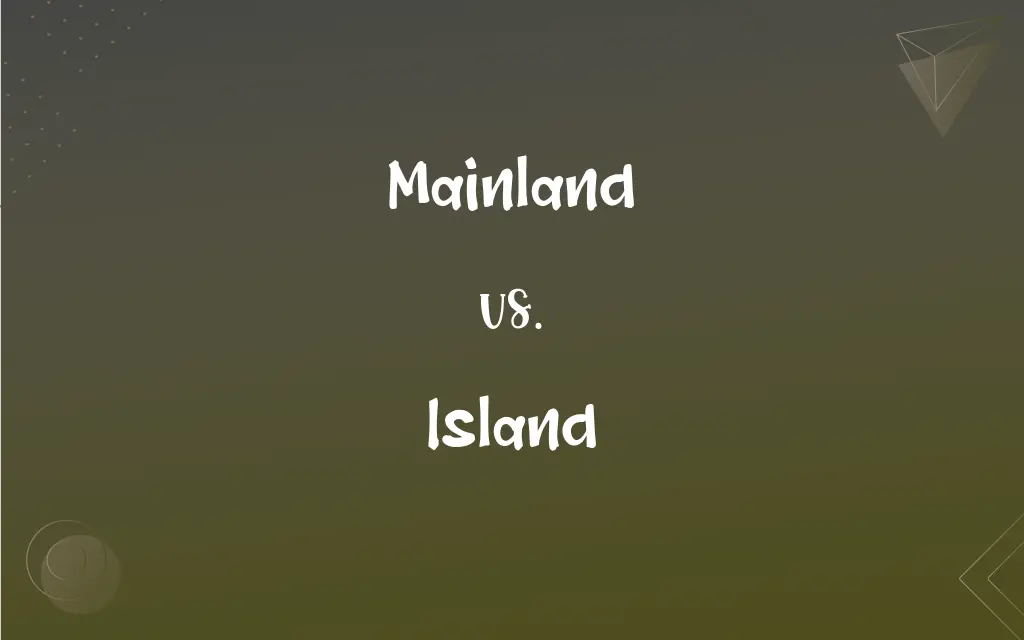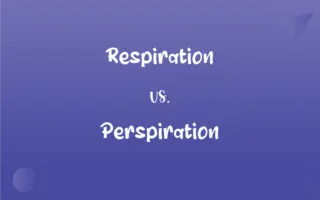Mainland vs. Island: What's the Difference?
Edited by Aimie Carlson || By Janet White || Published on November 24, 2023
The Mainland refers to a principal continuous landmass; an Island is a piece of land surrounded by water.

Key Differences
The Mainland typically describes the largest, continuous stretch of land in a particular area or country, distinguishing it from surrounding islands.
In contrast, an Island stands alone, being a body of land that is entirely encircled by water. Mainlands, by their very nature, are larger, often hosting a majority of a country's population and infrastructure. Islands, however, vary in size from sprawling landmasses like Greenland to small, uninhabited patches of land. The term "Mainland" is relative, dependent on one's perspective; for instance, what may be the Mainland for one group might be considered an Island to others.
Similarly, Islands can be found in oceans, lakes, or rivers, differing vastly in climate, ecosystem, and human habitation. While the Mainland might be seen as the core or primary landmass, Islands often carry unique cultural, biological, and geographical significances.
Comparison Chart
Definition
Principal landmass
Land surrounded by water
Examples
Continent or large region
Large (Greenland) to tiny islets
ADVERTISEMENT
Relative Size
Generally larger
Can be of any size
Surroundings
Not entirely by water
Completely by water
Typical Usage
Refers to primary regions
Refers to isolated land bodies
Mainland and Island Definitions
Mainland
The contiguous part of a country.
After visiting the islands, he returned to the Mainland.
Island
An area distinct from its surroundings.
The park felt like a tranquil Island amidst the bustling city.
ADVERTISEMENT
Mainland
A chief landmass in a region.
The Mainland of Europe is vast and diverse.
Island
An isolated territory or region.
In the vast ocean of sand, the oasis was like an Island.
Mainland
The primary continent or territory as opposed to islands.
She traveled from the Mainland to visit Hawaii.
Island
A landform within a body of water.
They sailed around the small Island in the lake.
Mainland
The largest part of a territory.
Most of the population lives on the Mainland.
Island
A body of land surrounded by water.
Bermuda is a beautiful Island in the Atlantic.
Mainland
A major landmass especially when considered in relation to nearby islands or attached peninsulas.
Island
Abbr. Isl. or Is. or I. A landmass, especially one smaller than a continent, entirely surrounded by water.
Mainland
The continent; the principal land, as distinguished from islands or a peninsula.
Island
An unattached kitchen counter providing easy access from all sides.
Mainland
The principal island of a group.
Island
A raised curbed area, often used to delineate rows of parking spaces or lanes of traffic.
Mainland
The continent; the principal land; - opposed to island, or peninsula.
After the two wayfarers had crossed from the peninsula to the mainland.
Island
The superstructure of a ship, especially an aircraft carrier.
Mainland
The main land mass of a country or continent; as distinguished from an island or peninsula
Island
(Anatomy) A cluster of cells differing in structure or function from the cells constituting the surrounding tissue.
Mainland
Land not isolated by water.
Ferries transport goods from the Mainland to nearby islands.
Island
To make into or as if into an island; insulate
A secluded mansion, islanded by shrubbery and fences.
Island
A contiguous area of land, smaller than a continent, totally surrounded by water.
Island
(by extension, in place names) A contiguous area of land, smaller than a continent, partially surrounded by water; A peninsula; A half-island.
Despite its name, Barry Island is actually a peninsula
Island
An entity surrounded by other entities that are very different from itself.
An island of colors on a butterfly's wing
Island
A superstructure on an aircraft carrier's deck.
Island
A traffic island.
The island in the middle of a roundabout
Island
(by extension, West Midlands dialect) A roundabout; A traffic circle.
Dunton island, near Birmingham, is one of the most confusingly labelled islands in the U.K.
In Coventry, you will often hear people say: “Turn right at the island”.
Island
A bench, counter, etc., that is not connected to a wall or other furniture and which can be used from any side.
Island
(government) An unincorporated area wholly surrounded by one or more incorporated areas.
Island
(grammar) A phrase from which a wh-word cannot be extracted without yielding invalid grammar.
Island
(transitive) To surround with water; make into an island.
Island
(transitive) To set, dot (as if) with islands.
Island
(transitive) To isolate.
Island
A tract of land surrounded by water, and smaller than a continent. Cf. Continent.
Island
Anything regarded as resembling an island; as, an island of ice.
Island
To cause to become or to resemble an island; to make an island or islands of; to isle.
Island
To furnish with an island or with islands; as, to island the deep.
Island
A land mass (smaller than a continent) that is surrounded by water
Island
A zone or area resembling an island
Island
A piece of land isolated from larger landmasses.
The Island was untouched by urban development.
FAQs
What is the Mainland?
The Mainland refers to the primary or largest landmass of a particular region, as opposed to its islands.
Do all countries have a Mainland?
No, some countries, like Maldives or Fiji, consist entirely of islands.
Is Australia an Island or a Mainland?
While Australia is an island by definition, it's often referred to as a continent or Mainland.
Can an Island be in a lake?
Yes, islands can be found in oceans, seas, rivers, and lakes.
How are islands formed?
Islands can form through various processes, including volcanic activity, sediment accumulation, and rising sea levels.
How is the Mainland important to island nations?
The Mainland often holds key infrastructure, resources, and a majority of the population, making it vital for commerce, transportation, and governance.
Is the Mainland always larger than an Island?
Generally, the Mainland is larger, but it's relative to one's perspective and geographical context.
Can an Island be larger than a Mainland in certain contexts?
Yes, in specific regional contexts, an Island might be considered larger than what is referred to as the Mainland.
Are there islands within islands?
Yes, there are instances where a body of water on an Island contains its own smaller islands.
What is an Island?
An Island is a piece of land completely surrounded by water.
Are there floating islands?
Yes, some islands, formed by vegetation and loose earth, can float on lakes or other bodies of water.
Can the Mainland be an Island at the same time?
Geographically, yes. For example, the Mainland of Australia is also the world's largest island.
Why are islands significant?
Islands can have unique ecosystems, cultures, and strategic importance.
What's the difference between an Island and an isle?
Both refer to a piece of land surrounded by water, but "isle" often denotes a smaller landmass or is used in poetic contexts.
What's the difference between the Mainland and the mainland?
"The Mainland" (capitalized) often refers to a specific region, while "the mainland" (lowercase) is a generic term for a primary landmass.
What's a group of islands called?
A group of islands is often referred to as an archipelago.
Can an Island become a Mainland?
If an island grows or merges over time to become the dominant landmass, it might be referred to as the Mainland in certain contexts.
How do people travel between the Mainland and islands?
Common methods include boats, ferries, and airplanes.
Are all islands inhabited?
No, many islands are uninhabited, either due to size, location, or inhospitable conditions.
How does living on the Mainland differ from living on an Island?
Island life might be more isolated with limited resources, while the Mainland often offers more infrastructure, accessibility, and amenities.
About Author
Written by
Janet WhiteJanet White has been an esteemed writer and blogger for Difference Wiki. Holding a Master's degree in Science and Medical Journalism from the prestigious Boston University, she has consistently demonstrated her expertise and passion for her field. When she's not immersed in her work, Janet relishes her time exercising, delving into a good book, and cherishing moments with friends and family.
Edited by
Aimie CarlsonAimie Carlson, holding a master's degree in English literature, is a fervent English language enthusiast. She lends her writing talents to Difference Wiki, a prominent website that specializes in comparisons, offering readers insightful analyses that both captivate and inform.






































































